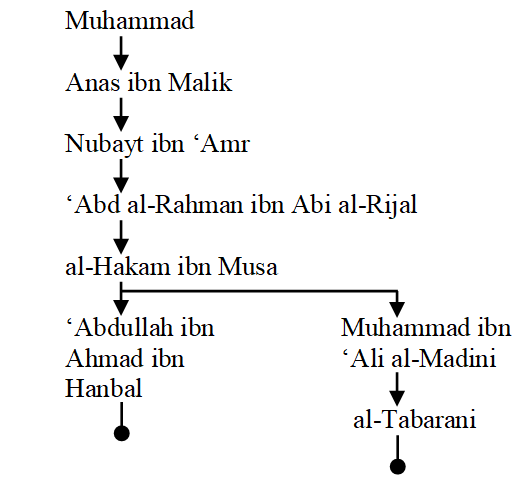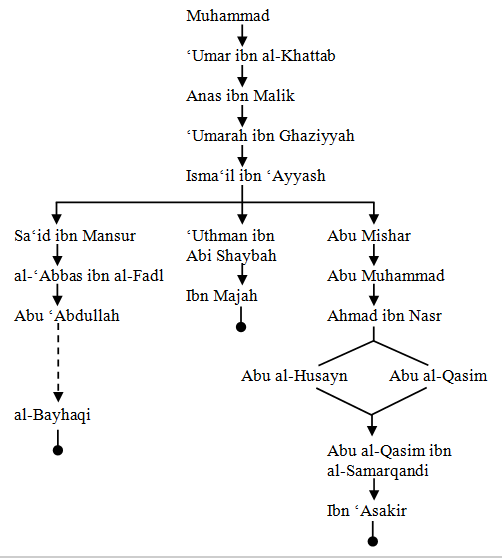I Introduction
There are narratives which say that a person will be forgiven
in the Hereafter if he offers forty prayers in the mosque. One
category specifies this mosque to the Prophet’s mosque in
Madinah and the other to all types of mosques.
In this article, the isnad of these narratives will be
critically evaluated.
II Texts and Isnad Analysis
(1)
حَدَّثَنَا عَبْد اللّٰهِ حَدَّثَنِي اَبِي
ثَنَا الْحَكَمُ بْنُ مُوْسَي قَالَ اَبْو عَبْد الرَّحْمَنِ
عَبْد اللّٰه وَسَمِعْتُهُ اَنَا مِنَ الْحَكَمِ بْنِ مُوْسَي
ثَنَا عَبْدُ الرَّحُمَنِ بْنُ اَبِي الرِّجَالِ عَنِ نُبَيْطِ
بْنِ عُمَرَ عَنْ اَنَسِ بْنِ مَالِكٍ عَنِ النَّبِيِّ صَلَّي
اللّٰه عَلَيْهِ وَسَلَّمَ اَنَّهُ قَالَ مَنْ صَلَّي فيِ
مَسْجِدِي اَرْبَعِينَ صَلَاةً لَا يَفُوْتُهُ صَلَاةٌ كُتِبَتْ
لَهُ بَرَاءَةٌ مِنَ النَّارِ وَنَجَاةٌ مِنَ الْعَذَابِ
وَبَرِيَء مِنَ النِّفَاقِ
Anas ibn Malim reported that the Prophet said: “He who offers
forty prayers in my mosque such that he misses none of them,
he is secure from the fire and punishment of Hell and also
from hypocrisy.”
Following is the schematic illustration of the isnad of this
narrative’s variants:

Nubayt ibn ‘Umar is majhul al-‘ayn because the only person to
narrate from him is ‘Abd al-Rahman ibn Abi al-Rijal.
(2)
حَدَّثَنَا عُثْمَانُ بْنُ اَبِي شَيْبَةَ
ثَنَا اِسْمَاعِيْلُ بْنُ عَيَّاشٍ عَنْ عُمَارَةَ بْنِ
غَرِيَّةَ عَنْ اَنَسِ بْنِ مَالِكٍ عَنْ عُمَرَ بْنِ
الْخَطَّابِ عَنْ النَّبِيِّ صَلَّي اللّٰه عَلَيْهِ وَسَلَّمَ
اَنَّهُ كَانَ يَقُوْلُ مَنْ صَلَّي فِي مَسْجِدٍ جَمَاعَةً
اَرْبَعِيْنَ لَيْلَةً لَا تَفُوْتُهُ الرَّكْعَةُ الْأُولَي
مِنْ صَلَاةِ الْعِشَاءِ كَتَبَ اللّٰه لَهُ بِهَا عِتْقًا مِنْ
النَّارِ
‘Umar ibn al-Khattab reported that the Prophet said: “He who
offers forty prayers in congregation in a mosque such that he
does not miss the first rak‘at behind the prayer leader, God
renders him secure from the fire.”
Following is the schematic illustration of the isnad of this
narrative’s variants:

According to al-Tirmidhi and al-Daraqutni, ‘Umarah ibn
Ghaziyyah has not met Anas ibn Malik.
Hence the narrative is broken.
Isma‘il ibn ‘Ayyash (d. 182 AH is only reliable in narratives
which he narrates from the Syrians (idha haddatha ‘an ghayr-i
ahl al-Sham idtaraba wa akhta’a).
In the narrative under discussion, he narrates from ‘Umarah
who is not a Syrian.
Al-Daraqutni also mentions another chain of narration of this
narrative –though incomplete:
وروى هذا الحديث أبو العلاء الخفاف خالد بن
طهمان الكوفي عن حبيب بن أبي عميرة الإسكاف عن أنس عن النبي صلي
اللّٰه عليه وسلم لم يذكر فيه عمر
Thus the inqita‘ is obvious. Moreover Habib al-Iskaf is
matruk according to al-Daraqutni.
III Conclusion
It is evident from the above mentioned information that both
categories of narratives are not reliable.
ـــــــــــــــــــــــــ
____________________
|